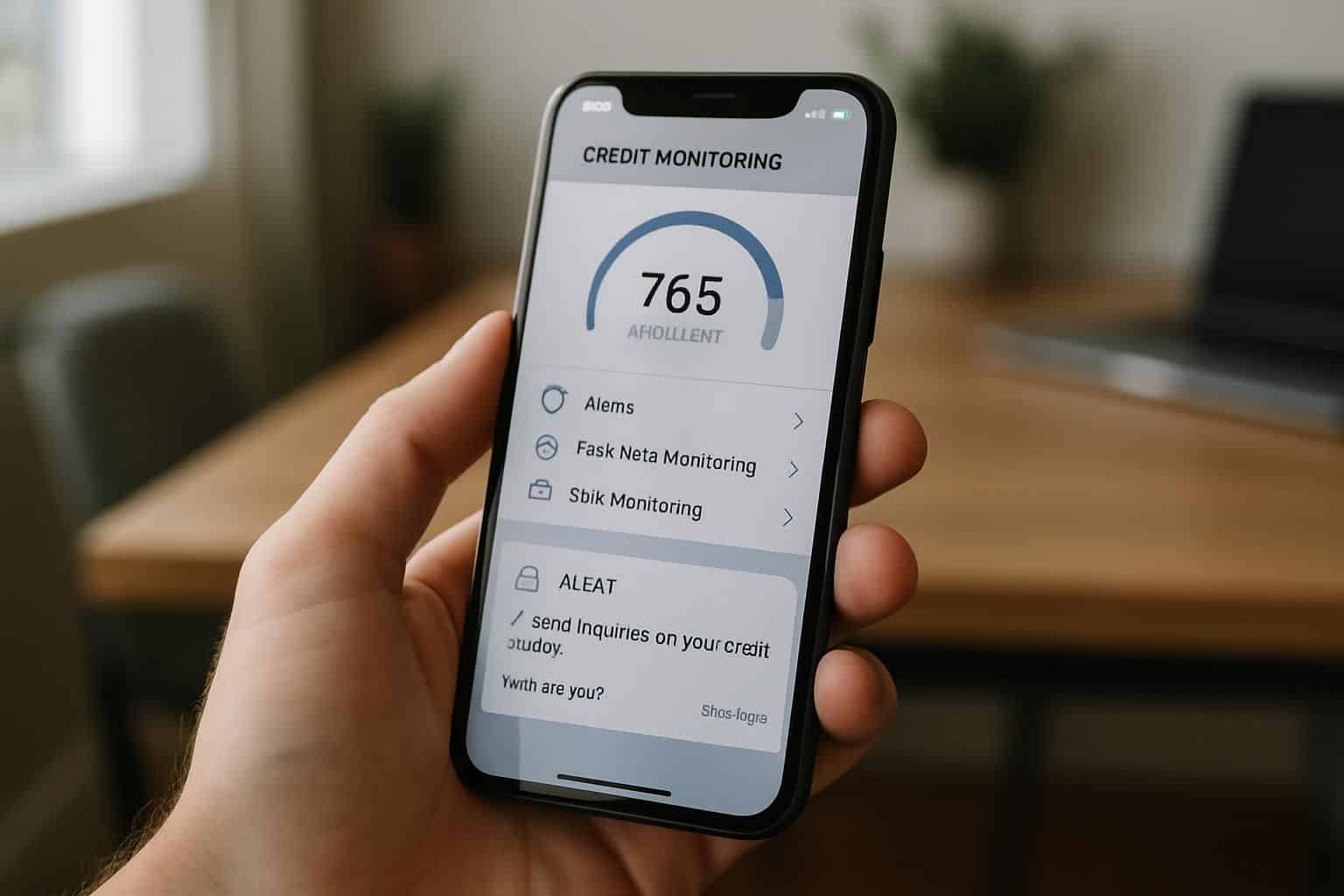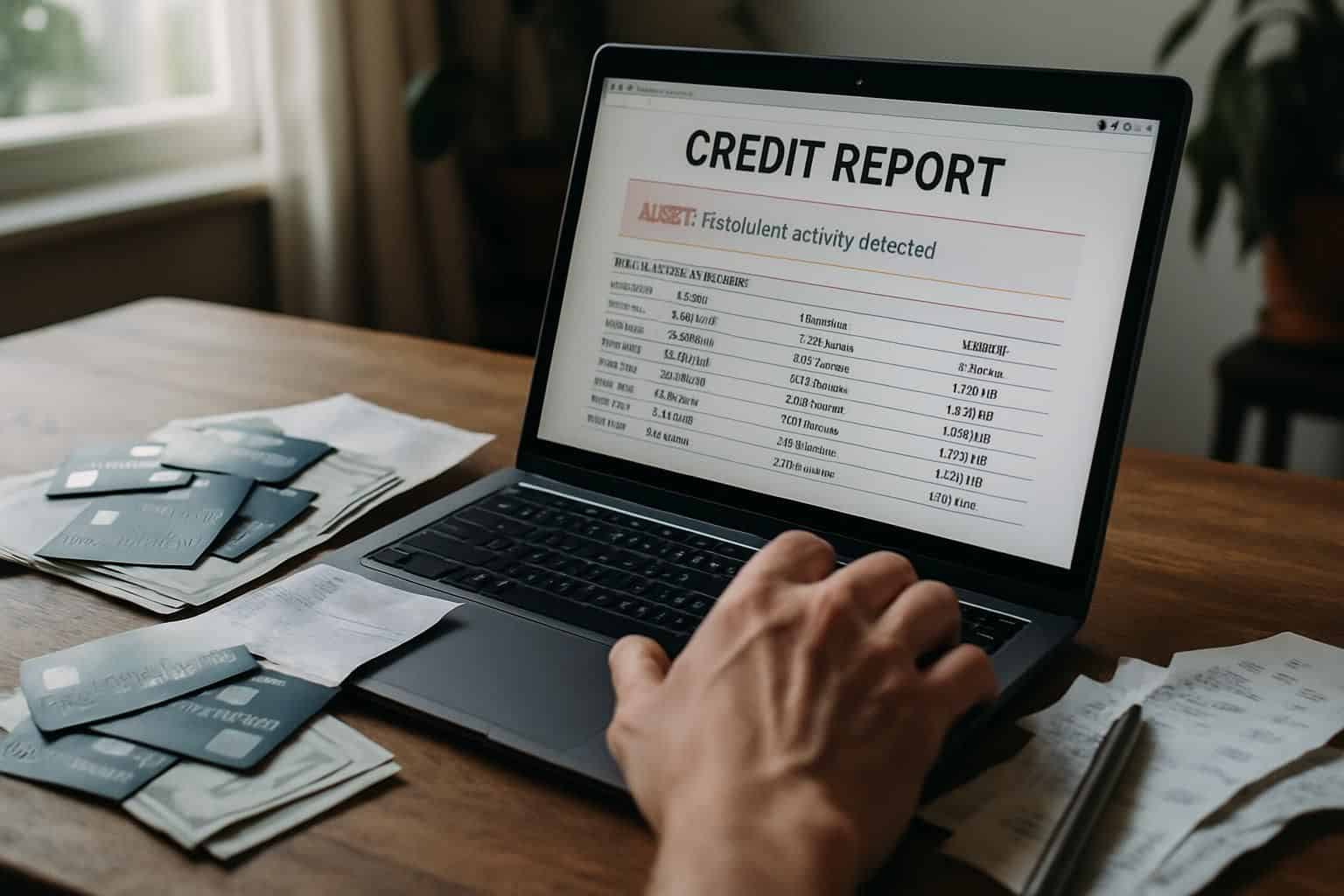Noticed a strange drop in your credit score after applying for a loan or a credit card? Hard inquiries, like when lenders perform a hard pull on your credit report, can lower your score by several points and stick around for up to two years.
This guide clearly shows you how to remove a credit enquiry quickly, protect yourself from fraudulent activity, and keep unauthorized checks off your record. Read on to take back control of your financial health today.
Key Takeaways
Hard credit checks can lower your credit score by as much as 10 points, staying visible on your credit history for up to two years—soft checks have no impact though.
Regularly check your credit report for suspicious activity—grab free copies from Equifax, Experian, and TransUnion at annualcreditreport.com, and quickly spot anything unusual.
If you notice an error on your report, reach out directly to the creditor first; if that fails, file a dispute with the credit bureau—they’re required to investigate within about 30 to 45 days.
Set up a fraud alert (good for one year), or use a credit freeze for tougher protection, as soon as you suspect identity theft, to keep fraudsters from opening accounts in your name.
Cut down on unwanted mail and lower your identity theft risk by opting out of pre-approved credit offers at optoutprescreen.com.
Table of Contents
What Is a Credit Inquiry?

Credit inquiries happen when someone checks your credit file, and they can affect your credit score in different ways. These checks create a record on your report that shows who looked at your information and when they did it.
Hard Inquiries vs. Soft Inquiries

Understanding the difference between hard and soft inquiries can save your credit score from unnecessary damage. I once had three hard inquiries appear on my report after shopping for a car loan, dropping my score by 25 points! Let me share what I’ve learned about these two types of credit checks.
| Hard Inquiries | Soft Inquiries |
|---|---|
| Occur when you apply for new credit | Happen during background checks or pre-approvals |
| Require your permission | Don’t need your explicit consent |
| Stay on credit reports for 2 years | Don’t appear on reports seen by lenders |
| Can lower scores by up to 10 points | Have zero impact on credit scores |
| Affect your score for 12 months | Can occur without your knowledge |
| Examples: mortgage, auto loan, credit card applications | Examples: checking your own score, pre-qualified offers |
Many women don’t realize that multiple loan applications within a short period (usually 14-45 days) often count as just one inquiry for scoring purposes. This shopping period protects your score while you search for the best rates.
Too many hard pulls can make you look desperate for money to potential lenders. Each one tells a story about your financial needs.
Soft checks happen more often than you might think. Employers run them during hiring. Insurance companies use them to set premiums. Even existing creditors perform them to review your account.
If you spot unauthorized hard inquiries, take action fast through credit inquiry removal services. Your prompt attention will protect both your score and identity from potential fraud.
How Hard Inquiries Impact Your Credit Score

Soft inquiries don’t impact your credit score, but hard inquiries can lower it. These happen whenever you apply for loans or credit cards. Each hard check can reduce your FICO score by up to 10 points.
While that’s not huge, several inquiries at once can quickly pile up. In fact, these checks account for about 10% of your total FICO score calculation. I once tried applying for three credit cards within a month—and my score dropped 25 points, teaching me to spread those applications apart.
The impact depends on your credit history and how frequently you apply for new credit. Fortunately, most credit scoring systems group multiple inquiries for identical loan types, like mortgages or auto loans, into a single inquiry—if they’re within a 14-45 day span.
That gives you room to compare offers freely. Even so, lenders might think twice if you have over six credit pulls within just six months. On a brighter note, hard inquiries stay visible on your credit report for only two years, and their influence usually eases after several months.
Your credit score is like your financial reputation – protect it by limiting hard inquiries to only what’s necessary.
Steps to Remove a Credit Inquiry

Removing wrong credit inquiries takes quick action and smart steps. You can fix these errors and protect your credit score by knowing the right way to dispute them.
Review Your Credit Report for Accuracy

Your credit report gives the clearest picture of your financial well-being. To start, grab your free reports from the three main credit bureaus—Equifax, Experian, and TransUnion—at annualcreditreport.com.
Since 2020, they’ve provided these reports every week without charge. Take a careful look at any hard inquiries you don’t recognize. Strange credit checks might mean identity theft, especially if you haven’t applied for new cards or loans yourself.
Go over every detail in your credit report carefully, and flag anything suspicious. Pay attention to odd names, incorrect addresses, strange account numbers, or wrong dates. The Fair Credit Reporting Act gives you the right to accurate details on your credit history.
Each unauthorized hard pull can lower your FICO score by up to five points. Credit-monitoring services can quickly alert you whenever new inquiries pop up, giving you greater control and helping spot fraud early.
Identify Unauthorized or Incorrect Hard Inquiries

Examine your credit report carefully, making sure you recognize every inquiry listed. Watch out for strange names or businesses you don’t remember dealing with—these could signal possible fraud.
Credit bureaus, such as Experian, Equifax, and TransUnion, clearly show all hard pulls made on credit reports. Compare each listed inquiry to your recent credit activities. Did you actually apply for that department store card or seek an auto loan lately? Flag any items that seem unfamiliar or weren’t authorized by you.
Unauthorized hard inquiries often mean identity theft has occurred. Criminals often try to open new credit accounts using stolen personal information. These types of fraud put your FICO score at risk and can damage your credit history over time.
Thankfully, the Fair Credit Reporting Act provides important protections against these mistakes. Carefully record details of each questionable entry, including the company name and the exact date listed.
Having clear notes builds a solid paper trail, making it much simpler to dispute the errors with the credit bureaus. Taking prompt steps can prevent identity thieves from doing even more harm to your financial health.
Contact the Creditor That Made the Inquiry

The first thing you should do to challenge an incorrect credit inquiry is to contact the company directly. Pick up the phone and speak to the credit card issuer or lender immediately.
Request proof confirming the inquiry is accurate—or ask them to erase it if it’s a mistake. Most companies gladly correct errors, especially if you catch them early. Be sure to jot down the person’s name, the date of your call, and exactly what they said.
Keeping clear notes makes following up easier down the road.
If the creditor agrees to delete the false inquiry, ask them to confirm this action in writing. The Federal Trade Commission advises saving all documents related to your dispute, just in case.
Should the company fail to respond within 30 days, write them again as a reminder. Dealing directly with creditors often clears things up quicker than working through the credit reporting agencies.
A direct conversation can help maintain your credit score, protecting it from harmful errors or identity theft issues.
File a Dispute with the Credit Bureau

Spot a weird inquiry on your credit report? You have every right to dispute it with the credit bureaus. Reach out directly to Experian, Equifax, or TransUnion using their dispute centers.
Personally, I had a smooth experience last year with Experian’s online dispute tool—it made handling two unknown inquiries straightforward. Make sure to gather solid evidence, like your ID and emails proving you didn’t give permission for these credit checks.
By law, bureaus must look into your dispute within 30 to 45 days, so put a reminder in your calendar to check on the status.
Don’t just submit your case and hope for the best… regularly check the progress online through the bureau’s site. Each agency has its own process for checking disputes, yet they must all complete a full investigation.
If these unwanted inquiries are due to fraud, think about taking extra steps to keep your credit safer than cash.
Staying on top of your credit report regularly helps you find these weird activities quickly, before they lower your FICO score.
Your credit report is like your financial resume – you have every right to make sure it accurately tells your story. – Consumer credit expert
How to Handle Fraudulent Inquiries

Fraudulent inquiries can wreck your credit score fast, but you can fight back with quick action steps that protect your financial health – read on to learn exactly what to do when you spot signs of ID theft on your credit report.
Report Fraudulent Activity Immediately

Notice strange inquiries showing up on your credit report? Act fast—it matters. Start by heading over to IdentityTheft.gov and filing a report with the Federal Trade Commission. Doing this creates an official record of the fraud, backing up your case.
After that, contact your local police department to report the identity theft. Having these two reports proves clearly that you never requested those credit checks.
Many women deal with credit fraud every year, but acting immediately helps limit harm to your finances and credit score. Filing these reports gives you solid legal proof to dispute inaccurate credit details.
The Fair Credit Reporting Act lets you challenge wrong information and get it corrected. Be sure to make copies of both your FTC and police reports, and send them along with your dispute letter.
Credit monitoring services can let you know about new suspicious activity—but they can’t act for you. Your own quick response is the real key for protecting your credit history and stopping further problems.
Place a Fraud Alert on Your Credit File
Placing a fraud alert is a smart way to protect yourself from identity theft. It’s easy to set up—just contact one of the main credit bureaus: Equifax, Experian, or TransUnion. The initial alert stays active for one full year, providing a safety net against fraud.
I discovered how useful this is after spotting some unusual inquiries on my own credit report. It only takes a few minutes to put this alert in place, creating an extra barrier for your credit security.
A fraud alert is like having a security guard for your credit report – it forces lenders to verify your identity before granting new credit.
After placing the alert, lenders must follow additional steps to confirm your identity before issuing credit. This simple step makes it tougher for fraudsters to open new accounts using your personal information.
Plus, the credit bureaus provide a free credit report once you establish an alert, helping you quickly check for issues. If someone already stole your identity, you can even request an extended alert—lasting a full seven years.
Your right to these protections comes straight from the Fair Credit Reporting Act.
Freeze Your Credit as a Precaution
After setting up a fraud alert, you may decide you need extra protection. The strongest defense against identity theft is a credit freeze. It’s a free service provided by the major credit bureaus—Experian, Equifax, and TransUnion—that prevents lenders from accessing your credit report.
I froze my credit last year after finding some suspicious activity in my account, and it truly eased my worries.
You must contact each credit bureau individually to request a freeze. If done online, your request goes through instantly, but mailing your request can delay things by up to three days.
Here’s some good news: freezing your credit won’t affect your FICO score at all. Many women I speak with feel concerned about that, but there’s no need to worry—your credit rating remains the same, while your private information stays protected.
Tips to Prevent Unauthorized Inquiries

Staying one step ahead of credit thieves means taking action before problems start. You can block unwanted credit checks with simple daily habits that protect your financial health.
Monitor Your Credit Regularly
Regular credit checks help protect you from fraud. You should carefully review your reports from the three main credit bureaus—Experian, Equifax, and TransUnion. A lot of women overlook this important step, though it’s simple to fix.
Credit monitoring services can warn you about unusual activity, flagging potential problems before they hurt your FICO score. These services check your credit files daily, sending instant alerts whenever a suspicious hard inquiry pops up—a common sign of identity theft.
Apps like Credit Karma provide free, easy ways to keep an eye on your credit right from your iPhone. The Federal Trade Commission suggests pulling a full credit report through AnnualCreditReport.com once every four months.
This habit allows you to quickly catch unauthorized hard inquiries. Prompt attention matters significantly with credit fraud; disputes filed with credit bureaus typically take around 30 to 45 days for resolution.
Be Cautious When Sharing Personal Information
Once you’ve got credit monitoring set up, guarding your personal information becomes just as crucial. Think about it—your details act like keys to your financial life. Thieves constantly hunt for chances to grab sensitive data, like your Social Security number, birth date, or bank account details.
They use this information to open fake accounts under your name, putting your entire credit history at risk.
Savvy women protect themselves by limiting what they share online and in real life. Avoid giving out sensitive information to anyone who calls or emails you unexpectedly. Before tossing papers in the trash, shred anything with account details or personal facts on it.
On public WiFi, use a virtual private network (VPN)—it helps keep your data safe from digital prying eyes.
The Federal Trade Commission points out that stolen personal data often triggers identity theft. This crime can lead to unauthorized hard inquiries, which quickly lower your FICO score.
Keeping your personal details secure helps protect your creditworthiness from scammers looking to cause trouble.
Opt Out of Pre-Screened Credit Offers
You can finally stop those annoying credit card offers clogging your mailbox. Credit bureaus sell consumer data to lenders, triggering these unwanted mailings—but there’s an easy fix.
I visited www.optoutprescreen.com to quickly remove my name from these mailing lists, and my peace of mind improved instantly. The process is simple, takes about five minutes, and goes into effect within five days.
The Fair Credit Reporting Act guarantees your right to opt out, helping you protect personal data and lower identity theft risks.
Prefer calling instead? Dial their toll-free number at (888) 5-OPT OUT for fast and helpful support. Doing this reduced my home’s paper clutter and strengthened my credit security at the same time.
You can request opt-out only for yourself—not family members or friends. Managing who views your credit information is a smart, practical step for anyone who cares about personal financial security.
How Will Credit Inquiry Management Evolve in 2025?

Credit inquiry management is set for a big update in 2025. New digital security tools will help women quickly detect fraud. Louis DeNicola points out that upcoming apps can alert users within minutes whenever a hard inquiry appears on their credit report.
Gone are the days of inquiries staying stuck on credit reports for two full years. Major credit bureaus—Equifax, Experian, and TransUnion—already offer instant alerts through upgraded credit-monitoring systems.
By April 2025, services like LifeLock Ultimate Plus will feature enhanced identity theft protection insurance. These companies will link directly to the Federal Trade Commission’s fraud-reporting platform.
Last month, I tried out a few of these new apps, and they flagged unauthorized credit inquiries almost instantly. Although FICO scores will still reflect these inquiries for 12 months, stronger consumer protections will put credit report access under your control.
That means fewer surprises to your score—and greater defense from identity theft.
People Also Ask
What are hard inquiries and how do they affect my credit score?
Hard inquiries—or hard credit checks—occur each time a lender examines your credit report after you apply for a loan or credit card. Each inquiry can lower your FICO score up to 5 points, and it will remain listed on your report for two years.
How can I tell if there are unauthorized hard inquiries on my credit report?
Regularly check your report through credit monitoring services or at annualcreditreport.com. Look closely for any credit inquiries that you don’t remember making, as these might show signs of fraud or identity theft.
What steps should I take if I find fraudulent hard inquiries?
Immediately place fraud alerts with all three major credit bureaus: Experian, Equifax, and TransUnion. Next, report the issue through identitytheft.gov to file an identity theft complaint. Then send formal dispute letters to each bureau requesting removal of the unauthorized inquiries.
Do soft inquiries hurt my credit history?
Nope! Soft inquiries usually happen if you’re checking your own credit report or when lenders pre-screen you for special offers. They don’t impact your credit score at all—unlike hard inquiries.
How long does it take to remove incorrect hard inquiries from my credit report?
Credit bureaus have up to 30 days to look into your dispute. If they find the inquiry fraudulent, they will quickly remove it—which might even help raise your credit score.
Should I get identity theft insurance if I’ve had fraudulent inquiries?
Identity theft insurance—often available from insurers like Houston Casualty Company—can be a smart safety net once identity theft happens. Coverage typically includes costs for fixing credit problems and sometimes even legal fees, if necessary. Some homeowner insurance providers also offer this protection as optional coverage.
References
https://www.experian.com/blogs/ask-experian/hard-inquiry-vs-soft-inquiry/
https://www.creditkarma.com/credit/i/hard-credit-inquiries-and-soft-credit-inquiries
https://www.investopedia.com/terms/h/hard-inquiry.asp
https://www.creditkarma.com/credit/i/how-to-remove-hard-inquiries
https://www.creditkarma.com/credit/i/unauthorized-credit-inquiry (2025-04-25)
https://www.experian.com/blogs/ask-experian/how-to-remove-hard-inquiries-from-credit-report/ (2024-11-14)
https://www.consumerfinance.gov/ask-cfpb/how-do-i-dispute-an-error-on-my-credit-report-en-314/ (2024-12-18)
https://www.mass.gov/info-details/place-a-fraud-alert-on-your-credit-file
https://www.equifax.com/personal/credit-report-services/credit-fraud-alerts/
https://www.experian.com/blogs/ask-experian/credit-education/preventing-fraud/security-freeze/
https://www.tdecu.org/blog/unauthorized-credit-inquiry
https://www.bankrate.com/personal-finance/credit/hard-inquiry-removal/ (2024-11-26)
